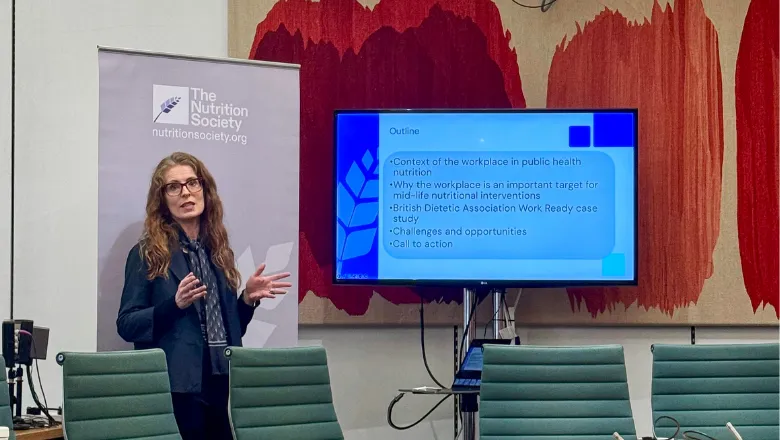
Dr Rachel Gibson
Senior Lecturer
- King's Food Living Laboratory Academic Lead
Research interests
- Nutrition
Contact details
Biography
Biographical details
I am a UK Registered Dietitian. I graduated with a BSc (Hons) in Nutrition and Dietetics from King’s College London in 2013. I completed my PhD in Nutritional Epidemiology at Imperial College London in 2017 (The association between diet and working hours with markers of cardio-metabolic health in the British police force). As part of my PhD I established the nutritional assessment arm of the Airwave Health Monitoring study – an ongoing longitudinal cohort study of the Great British police force conducted by Imperial College London. Following completion of my PhD I worked as a Teaching Fellow for the MRes Clinical Research (Human Nutrition) programme at Imperial College London until I joined King’s College London as a Lecturer in early 2018. I have clinical dietetic experience in lipid management, weight management and workplace nutrition. I am a member of the British Dietetic Association Public Health Specialist Group Committee and BDA Work Ready Steering Group. Prior to training as a Dietitian I gained a BA(Hons) in Retail Marketing from Manchester Metropolitan University and worked in business management roles across various industries including the food service sector.
Research interests
My research interests focus in two main areas: 1) workplace, diet and health and 2) dietary patterns and health
- Workplace, diet, and health:
The World Health Organisation describes ‘multifactorial work-related diseases’ as diseases that occur in the general population but may be exacerbated or partially caused by occupational exposures. There is increasing evidence to suggest that cardiovascular diseases and type 2 diabetes are associated with job strain and working hours (e.g., duration and time). Despite the role of diet in the aetiology of cardiometabolic disease being well established, gaps remain in understanding the relationships between occupational exposures, diet and cardiometabolic health. My workplace diet and health research is primarily focused in the following areas: 1) the influence of occupational factors (working hours and environment) on diet and health, 2) understanding the evidence to support nutrition, health and wellbeing in the workplace and 3) the development of workplace strategies to improve employee nutrition, health and wellbeing.
- Dietary patterns and health
Nutritional science has evolved in recent decades from focusing of single nutrients and foods and their associations with health to understanding how the combination of the foods people eat impact health. Dietary patterns (e.g., Mediterranean diet, DASH diet) are used to measure the whole diets of populations. My research looks at how we measure dietary patterns and how they can be translated into practice. Current projects in this area are investigating how the Mediterranean Diet may improve psoriasis outcomes and how plant based dietary patterns may benefit mental wellbeing.
Research

Obesity, Type 2 Diabetes & Immunometabolism Research Group
We are experimental medicine researchers and clinical academics. Our ‘bench to bedside’ research spans from basic discovery science, investigating the immune system and the susceptibility to obesity/insulin resistance, to an array of clinical studies investigating the impact of pharmacotherapy, bariatric surgery, diet and ethnicity on obesity and type 2 diabetes.

Population Health @ King’s
Population Health expertise from across King's

Workplace nutrition and health
Metabolic disorders such as cardiovascular diseases and type 2 diabetes are increasingly understood to be associated with occupational factors such as job strain and working hours.

Dietary assessment and dietary biomarkers
A key limitation in nutrition research is that current methods available for dietary assessment, including food frequency questionnaires (FFQs), food diaries or dietary recalls, are known to be error-prone and inaccurate, as they rely on self-report assessment which are subject to bias.

Cardiometabolic health and diet
The Cardiometabolic health and diet Research Group is led by Dr Wendy Hall.

Workplace nutrition and health
Metabolic disorders such as cardiovascular diseases and type 2 diabetes are increasingly understood to be associated with occupational factors such as job strain and working hours.

Dermatology and nutrition (nutritional dermatology)
Dermatology and nutrition (nutritional dermatology) is an emerging field that recognises the role that diet may play in the management of chronic skin disorders.

Chrononutrition
Chrononutrition is the study of interactions between diet, circadian rhythms, and sleep, and their impact on health. Misalignment between circadian rhythms and the timing of eating may have adverse effects on metabolic function and increase risk of weight gain.

Dietary assessment and dietary biomarkers
A key limitation in nutrition research is that current methods available for dietary assessment, including food frequency questionnaires (FFQs), food diaries or dietary recalls, are known to be error-prone and inaccurate, as they rely on self-report assessment which are subject to bias.

Education research in nutrition & dietetics
The Department of Nutritional Sciences aims to provide world class education to students enrolled on our programmes in Nutrition & Dietetics and to continually strive for excellence by undertaking education research.
News
King's College London joins Menus of Change University Research Collaborative
King’s has joined the Menus of Change University Research Collaborative (MCURC), as a result of collaborative work between King's Food and the Department of...

Dr Rachel Gibson: The role of workplaces in shaping nutritional health
Dr Gibson recently shared her expertise at the All Party Parliamentary Group on Nutrition: Science and Health

Lockdown used by those with unhealthy lifestyles to get healthier
According to the largest study of diet and lifestyle behaviour during COVID-19, the disruption caused by lockdown restrictions spurred many people,...

Events

KCS Networking Event: Education for Sustainability Projects
KCS Networking Event on the Education for Sustainability Projects Fund
Please note: this event has passed.

Embedding nutrition research and education in a real-world setting: The potential of living laboratories in higher education
Department of Nutritional Sciences Seminar Series
Please note: this event has passed.
Research

Obesity, Type 2 Diabetes & Immunometabolism Research Group
We are experimental medicine researchers and clinical academics. Our ‘bench to bedside’ research spans from basic discovery science, investigating the immune system and the susceptibility to obesity/insulin resistance, to an array of clinical studies investigating the impact of pharmacotherapy, bariatric surgery, diet and ethnicity on obesity and type 2 diabetes.

Population Health @ King’s
Population Health expertise from across King's

Workplace nutrition and health
Metabolic disorders such as cardiovascular diseases and type 2 diabetes are increasingly understood to be associated with occupational factors such as job strain and working hours.

Dietary assessment and dietary biomarkers
A key limitation in nutrition research is that current methods available for dietary assessment, including food frequency questionnaires (FFQs), food diaries or dietary recalls, are known to be error-prone and inaccurate, as they rely on self-report assessment which are subject to bias.

Cardiometabolic health and diet
The Cardiometabolic health and diet Research Group is led by Dr Wendy Hall.

Workplace nutrition and health
Metabolic disorders such as cardiovascular diseases and type 2 diabetes are increasingly understood to be associated with occupational factors such as job strain and working hours.

Dermatology and nutrition (nutritional dermatology)
Dermatology and nutrition (nutritional dermatology) is an emerging field that recognises the role that diet may play in the management of chronic skin disorders.

Chrononutrition
Chrononutrition is the study of interactions between diet, circadian rhythms, and sleep, and their impact on health. Misalignment between circadian rhythms and the timing of eating may have adverse effects on metabolic function and increase risk of weight gain.

Dietary assessment and dietary biomarkers
A key limitation in nutrition research is that current methods available for dietary assessment, including food frequency questionnaires (FFQs), food diaries or dietary recalls, are known to be error-prone and inaccurate, as they rely on self-report assessment which are subject to bias.

Education research in nutrition & dietetics
The Department of Nutritional Sciences aims to provide world class education to students enrolled on our programmes in Nutrition & Dietetics and to continually strive for excellence by undertaking education research.
News
King's College London joins Menus of Change University Research Collaborative
King’s has joined the Menus of Change University Research Collaborative (MCURC), as a result of collaborative work between King's Food and the Department of...

Dr Rachel Gibson: The role of workplaces in shaping nutritional health
Dr Gibson recently shared her expertise at the All Party Parliamentary Group on Nutrition: Science and Health

Lockdown used by those with unhealthy lifestyles to get healthier
According to the largest study of diet and lifestyle behaviour during COVID-19, the disruption caused by lockdown restrictions spurred many people,...

Events

KCS Networking Event: Education for Sustainability Projects
KCS Networking Event on the Education for Sustainability Projects Fund
Please note: this event has passed.

Embedding nutrition research and education in a real-world setting: The potential of living laboratories in higher education
Department of Nutritional Sciences Seminar Series
Please note: this event has passed.
